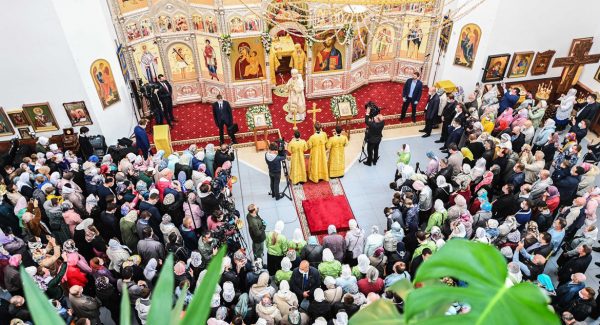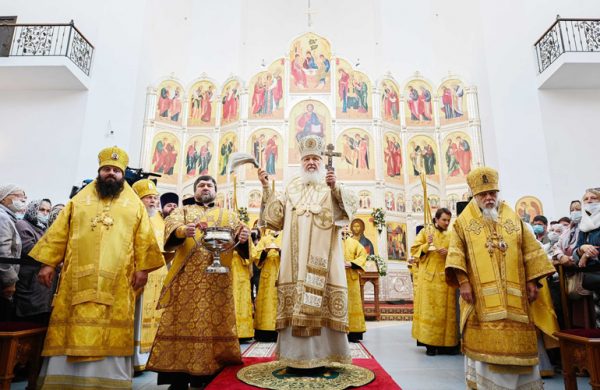On September 13, 2020, the 14th Sunday after Pentecost, His Holiness Patriarch Kirill of Moscow and All Russia performed the rite of great consecration of the Church dedicated to the Entry into the Church of the Most Holy Theotokos in Moscow and officiated the Divine Liturgy in the newly consecrated church, reports the official website of the Russian Orthodox Church.

Photo: Oleg Varov/foto.patriarchia.ru
At the end of the service, His Holiness Patriarch Kirill delivered the following sermon:
“In the name of the Father, the Son and the Holy Spirit!
If you consider today’s Gospel reading (Matt. 22: 1-14), the main words that it contains raise many questions for any insufficiently trained person. These words are: “Many are called, but few are chosen.”
Let us also ask some questions together with those who are seeking to understand the meaning of this reading. If many are called into the Kingdom of Heaven, but few are chosen, what does this mean? Predestination? That God predetermined who would be chosen? After all, it is not said that a person chooses himself. Many are called, but few are chosen, but by whom? Are few chosen by God? It is on the basis of such misunderstanding of this text that a delusion arose in the history of theological thought, namely the doctrine of predestination, according to which everything is decided in advance in heaven. People are born, and one is predestined for the Kingdom of Heaven, and another for destruction.
The Church rejected this teaching. In fact, if everything is predetermined, then why suffer, why strain yourself? If everything is predetermined, let things take their course! But this is not at all true! And in the nuances, in the details of today’s Gospel reading, we can see the true meaning of the Savior’s words: “many are called, but few are chosen.”
What are these details? Clothes. Remember, the clothes that are not suitable for participation in the wedding celebration were mentioned in the parable. Indeed, if a loader, having barely finished his work, comes to the wedding feast in his dirty, oily clothes, he will be told: “Take a shower, change your clothes, and then come.” What do the clothes mean in the parable? It symbolically represents the participation of a person in the work of his salvation. The Lord calls every person to salvation, but the person himself needs to decide what clothes he will wear, that is, how he will live.
Clothes are our business. The Lord calls everyone, without making any distinctions, He does not predetermine a person’s life and his afterlife, despite the well-known theological error. Predestination is not an irresistible force, there is no predetermined program, but it is essential to dress correctly, going to the wedding feast, that is, to live correctly, to do the right things, and only then God’s predestination will lead a person to immortality in the Divine Kingdom.
Indeed, everything depends on the Lord. He is the Creator of the world. He can change the fate of every person, He can invade our daily life. Isn’t the prayer we turn to God a request for Him to invade our lives? If we are sick, we ask: heal us, that is, enter our life with Your strength, help us, compensate for our limitations, our weakness, our imperfection. We pray before exams, even when we are prepared: Lord, help me! Where I can humanly break, forget something: Lord support me! We pray before important events in our life, we ask the Lord for help – not so that He will do something for us, but that at that moment in life, when our weakness and imperfection can lead to a fatal mistake, the Lord would be with us.
Divine predestination closely interacts with human freedom. This is not an unconditional predestination, this is not a railroad switch. If you turn this switch, the train will only move in the direction the switch points to. But this is not the case in life. The Lord does not control a switch: we ourselves choose at the crossroads to move forward, to the right or to the left. We define our lives, but the Lord always remains with us. With His gracious help, in answer to our prayer, He can keep us from doing something wrong. He can help us choose the right path in life. He can help us enter the wedding feast, provided that we are wearing the right clothes, that is, if we do the right things.
This is how human freedom and Divine providence are combined, and in the combination of these two factors a person, his personality, his will play a huge role, because he, created in the image and likeness of God, has the sacred gift of freedom. Therefore, today’s Gospel reading should help us understand: it depends on the Lord whether to let us in to the feast or not, invite us or not. But what kind of clothes we put on is up to us. Let’s choose clean and bright clothes that will open the way for us to the Kingdom of Heaven! Amen.”

















